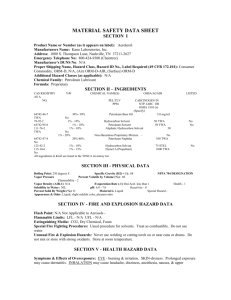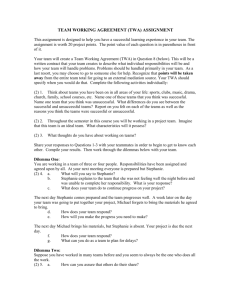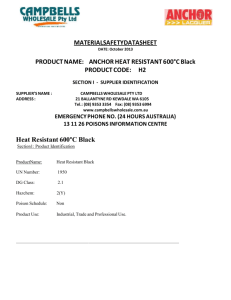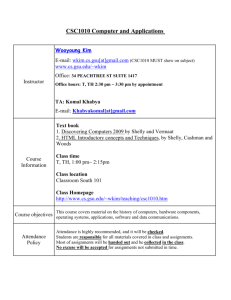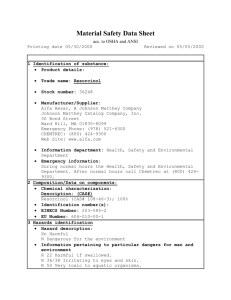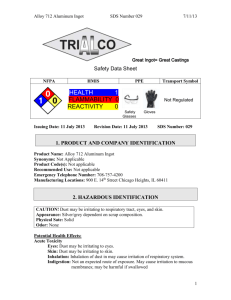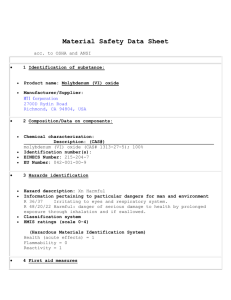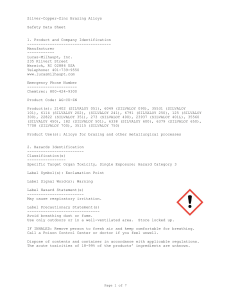NFPA
advertisement
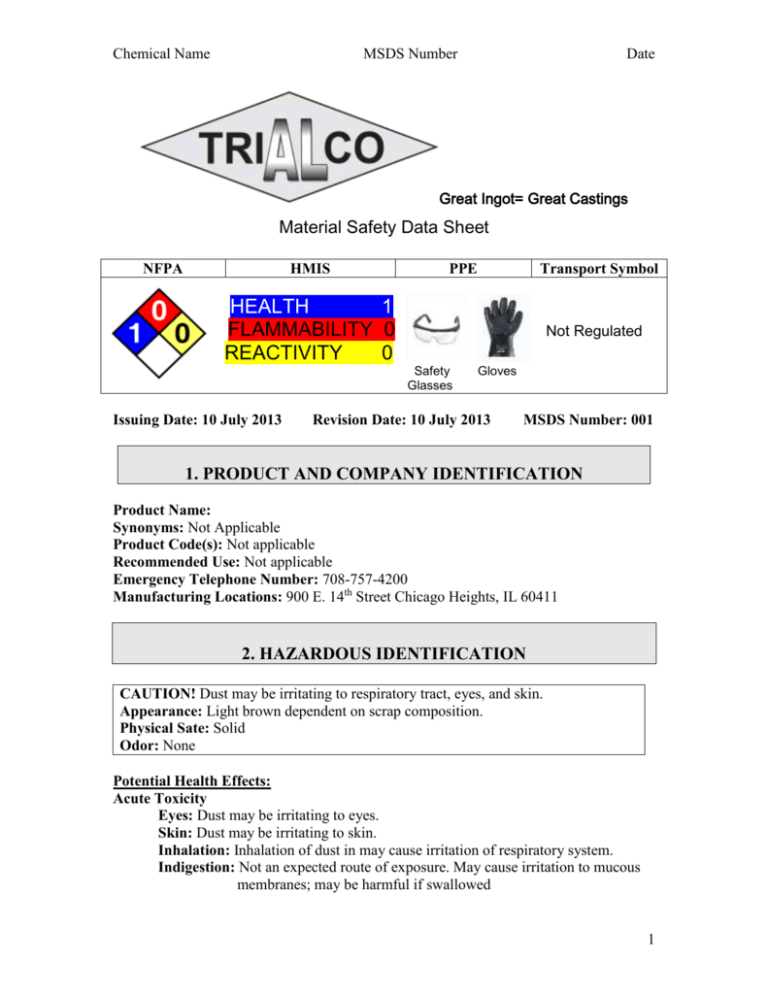
Chemical Name MSDS Number Date Great Ingot= Great Castings Material Safety Data Sheet NFPA HMIS PPE Transport Symbol HEALTH 1 FLAMMABILITY 0 REACTIVITY 0 Not Regulated Safety Glasses Issuing Date: 10 July 2013 Gloves Revision Date: 10 July 2013 MSDS Number: 001 1. PRODUCT AND COMPANY IDENTIFICATION Product Name: Synonyms: Not Applicable Product Code(s): Not applicable Recommended Use: Not applicable Emergency Telephone Number: 708-757-4200 Manufacturing Locations: 900 E. 14th Street Chicago Heights, IL 60411 2. HAZARDOUS IDENTIFICATION CAUTION! Dust may be irritating to respiratory tract, eyes, and skin. Appearance: Light brown dependent on scrap composition. Physical Sate: Solid Odor: None Potential Health Effects: Acute Toxicity Eyes: Dust may be irritating to eyes. Skin: Dust may be irritating to skin. Inhalation: Inhalation of dust in may cause irritation of respiratory system. Indigestion: Not an expected route of exposure. May cause irritation to mucous membranes; may be harmful if swallowed 1 Chemical Name MSDS Number Date Chronic Effects: Pulmonary fibrosis, facial pallor, anemia, gingival lead line, tremors, writs drop encephalopathy, nephropathy, hypotension. Aluminum has been implicated in Alzheimer’s disease. Lead, nickel, beryllium, cadmium, and hexavalent chromium have been implicated as carcinogens. See Section 11 for carcinogen status of components. Aggravated Medical Conditions: Medical conditions generally aggravated by exposure include any condition involving the GI tract, central nervous system, kidneys, blood, and gingival tissue. Environmental Hazard: See Section 12 for additional Ecological information. 3. COMPOSITION/INFORMATION ON INGREDIENTS Chemical Name CAS-No Weight % 4. FIRST AID MEASURES Eye Contact: Rinse immediately with plenty of water, also under the eyelids, for at least 15 minutes. If symptoms persist, call a physician. Skin Contact: Wash off immediately with plenty of soap and water for at least 15 minutes. If symptoms persist, call a physician. Inhalation: Move to fresh air. If not breathing, give artificial respiration. If breathing is difficult, give oxygen. If symptoms persist, call a physician. Ingestion: Not an expected route of exposure. Immediate medical attention is not required. Consult a physician if necessary. Notes to Physician: Treat symptomatically. 2 Chemical Name MSDS Number Date 5. FIRE-FIGHTING MEASURES Flammable Properties: Finely divided aluminum powder or dust may form explosive mixtures in air. Flash Point: Not applicable. Suitable Extinguishing Media: Do not use water or foam. Dry chemical recommended. Unsuitable Extinguishing Media: DO NOT USE WATER OR FOAM. Explosion Data Sensitivity to Mechanical Impact: None Sensitivity to Static Discharge: None Additional Precautions: None Specific Hazards Arising from the Chemical: Finely divided aluminum will form explosive mixtures in air. Protective Equipment and Precautions for Firefighters: As in any fire, wear self-contained breathing apparatus pressure-demand, MSHA/NIOSH (approved or equivalent) and full protective gear. NFPA: Health Hazard 1 Flammability 0 Stability 0 Physical/Chemical Hazards- HMIS: Health Hazard 1 Flammability 0 Stability 0 Personal Precautions- B 6. ACCIDENTAL RELEASE MEASURES Personal Precautions: Ensure adequate ventilation. Use personal protective equipment. Methods for Containment: Prevent further leakage or spillage if safe to do so. Methods for Cleaning Up: No special precautions for large product fragments. For dust cleanup, use protective equipment. Pick up and transfer to properly labeled containers. Clean contaminated surface thoroughly. Small/Large Spills: Clean up spilled material and place in dry metal containers. 3 Chemical Name MSDS Number Date 7. HANDLING AND STORAGE Handling: Handle in accordance with good industrial hygiene and safety practice. Wear personal protective equipment. Avoid dust formation. Do not breathe vapors/dust. Storage: Keep in a dry, cool, and well-ventilated place. 8. EXPOSURE CONTROLS/PERSONAL PROTECTION Exposure Guidelines: The following table lists exposure limits for all chemicals listed in Section 3 where a limit exists. Chemical Name Aluminum 7429-90-5 Aluminum Oxide 1344-28-1 Magnesium Oxide 1309-48-4 Cadmium 1306-19-0 Manganese 7439-96-5 Silicon 7440-21-3 Copper 7440-50-8 Magnesium 7439-95-4 Nickel 7440-02-0 Beryllium 7440-41-7 Chromium 7440-47-3 Tin 7440-31-5 ACGIH TLV TWA: 1 mg/m³ (dust) None TWA: 10 mg/m³ (inhalable) TWA: 0.002 mg/m³ TWA: 0.2 mg/m³ None TWA: 0.2 mg/m³ (fume) TWA: 1 mg/m³ (dust) TWA: 10 mg/m³ TWA: 1.5 mg/m³ TWA: 0.00005 mg/m³ TWA: 0.5 mg/m³ TWA: 2 mg/m³ OSHA PEL TWA: 15 mg/m³ (total) TWA: 5 mg/m³ (respirable) TWA: 5 mg/m³ (respirable) Ceiling: 15 ppm, total particulate None Ceiling: 5 mg/m³ TWA: 15 mg/m³ (total) TWA: 0.1 mg/m³ (dust) TWA: 10 mg/m³ (total) TWA: 1 mg/m³ TWA: 0.002 mg/m³ TWA: 1 mg/m³ TWA: 2 mg/m³ Other Exposure Guidelines: Hexavalent chrome may be formed during welding. The welding of aluminum alloys may generate carbon monoxide, carbon dioxide, ozone, nitrogen oxides, infrared radiation, and ultra-violet radiation. Engineering Measures: Showers, Eyewash Stations, Ventilation Systems Personal Protective Equipment Eye and Face Protection: Tightly fitting safety goggles. Avoid contact with eyes Skin and Body Protection: Impervious gloves. 4 Chemical Name MSDS Number Date Respiratory Protections: If exposure limits are exceeded or irritation is experienced, NIOSH/MSHA approved respiratory protection should be worn. Positive-pressure supplied air respirators may be require for high airborne containment concentrations. Respiratory protection must be provided in accordance with current local regulations. Hygiene Measures: Handle in accordance with good industrial hygiene/safety practice. 9. PHYSICAL AND CHEMICAL PROPERTIES Appearance: Light brown dependent on scrap composition Odor: None Odor Threshold: No information Available Physical State: Solid pH: No information available Flash Point: Not applicable Autoignition Temp: No info available Decomp Temp: No information available Boiling Point/Range: 4550ºF (2450ºC) Melting Point/Range: 1220ºF (660ºC) Flammability Limits in Air: No information available Explosion Limits: No info available Solubility: Insoluble Evaporation Rate: No info available Vapor Pressure: 1 @ 1284ºC Vapor Density: No data Specific Gravity/Density: No information available VOC Content: N/A 10. STABILITY AND REACTIVITY Stability: Stable under recommended storage conditions. Incompatible Products: Avoid halocarbons, mercury, chlorine, chlorates, bromates, iodates, peroxides, perchlorates, nitrates, nitrites, oxides, performates, persulfates, halogens, oxides of nitrogen, melted sulfates, sulfur dioxide, propylene dichloride sodium carbide, sodium carbonate, sodium hydroxide. Do not use with water. Conditions to Avoid: Avoid storage or potential contact with strong oxidizing agents. Hazardous Decomposition Products: Metal oxide fumes. Hazardous Polymerization: Hazardous polymerization does not occur. 5 Chemical Name MSDS Number Date 11. TOXICOLOGICAL INFORMATION Acute Toxicity: The product itself has not been tested. Chronic Toxicity: Aluminum metal and alloys have a low order of chronic toxicity. Overexposure to Manganese oxide fumes may cause metal fume fever. It is unlikely Magnesium will develop if exposure limits are maintained below the limits cited in Section 8. Symptoms of Magnesium develop very gradually and can include headache, irritability, insomnia, and muscle cramps. Chronic exposure to inert dust of silicon can cause increased airways resistance and contribute to chronic bronchitis. Carcinogenicity: The following metals and metal compounds are considered carcinogenic by the International Agency for Research on Cancer (IARC) and the National Toxicology program (NTP) as carcinogens: lead, beryllium, cadmium, hexavalent chromium, and nickel. Sensitization: Some individuals may be allergic to metals or metal salts. Sensitization to metals will generally take the form of a skin rash at the site of contact. Once an individual becomes sensitized, they should not have any further contact with the causative agent, since any exposure, however small, will trigger the symptoms. Mutagenic Effects: None Known Reproductive Toxicity: None Known Developmental Toxicity: None Known Target Organ Effects: No specific effects other than those listed under Chronic Toxicity 12. ECOLOGICAL INFORMATION Ecotoxicity: The environmental impact of this product has not been fully investigated. 13. DISPOSAL CONSIDERATIONS Waste Disposal Methods: Dispose of in accordance with all applicable environmental laws and regulations. Contaminated Packaging: Dispose of in accordance with applicable local regulations. 6 Chemical Name MSDS Number Date 14. TRANSPORT INFORMATION DOT U.S. Department of Transportation Not Regulated TDG Transport Dangerous Goods (Canada) Not Regulated MEX Transport Dangerous Goods (Mexico) Not Regulated ICAO International Civil Aviation Organization Not Regulated IATA International Air Transport Association Not Regulated IMDG/IMO International Maritime Dangerous Goods Code/ International Maritime Organization Not Regulated RID International Transport of Dangerous Goods by Rail Not Regulated ADR International Transport of Dangerous Goods by Rail Not Regulated AND International Transport of Dangerous Goods by Inland Waterway Not Regulated 15. REGULATORY INFORMATION U.S. Federal Environmental Regulations CONEG: This material meets CONEG requirements for packaging materials in that the sum of the concentration levels of incidentally introduced lead, mercury, cadmium, and hexavalent chromium present do not exceed 100 ppm. FDA: Not applicable SARA 313: Section 313 of Title III of the Superfund Amendments and Reauthorization Act of 1986 (SARA). This product contains a chemical or chemicals, which are subject to 7 Chemical Name MSDS Number Date the reporting requirements of the Act and Title 40 of the Code of Federal Regulations, Part 372. Chemical Name Aluminum dust and fines Cadmium Cobalt Manganese Zinc Copper Lead Nickel Beryllium Chromium CAS-No Weight % SARA 313 Threshold Values % 7429-90-5 7440-43-9 7440-48-4 7439-96-5 7440-66-6 7440-50-8 7439-92-1 7440-02-0 7440-41-7 7440-47-3 0-95% 0-3% 0-3% 0-1% 0-1.5% 0-1.5% 0-0.1% 0-0.1% 0-0.1% 0-0.1% 1.0 0.1 0.1 1.0 1.0 1.0 * (any amount) 0.1 0.1 0.1 SARA 311/312 Hazard Categories Acute Health Hazard: No Chronic Health Hazard: No Fire Hazard: No Sudden Release of Pressure Hazard: No Reactive Hazard: No U.S. State Regulations: California Proposition 65: This product contains chemicals known to the State of California to cause cancer or reproductive toxicity. Chemical Name Antimony oxide (Antimony trioxide) Arsenic (inorganic arsenic compounds) Arsenic (inorganic oxides) Beryllium and beryllium compounds Cadmium Cadmium and cadmium compounds Chromium (hexavalent compounds) Chromium (hexavalent compounds) Cobalt metal powder Cobalt [II] oxide Lead Mercury and mercury compounds Nickel (Metallic) Nickel compounds Nickel oxide Vanadium pentoxide (orthorhombic crystalline form) California Proposition 65 Cancer Cancer Developmental Cancer Developmental, Male Cancer Cancer Developmental, Female, Male Cancer Cancer Developmental, Female, Male Developmental Cancer Cancer Cancer CAS-No 1309-64-4 --------------7440-48-4 1307-96-6 ----7440-02-0 --1313-99-1 Cancer 1314-62-1 8 Chemical Name MSDS Number Date Nickel and chromium are listed by Pennsylvania as “Special Hazardous Substance” under Pennsylvania Worker and Community Right-to-Know Regulations. International Regulations: Mexico Chemical Name: Aluminum Nickel Manganese Carcinogen Status None IARC/NTP None Chromium IARC/NTP (hexavalent) Exposure Limits Mexico: TWA= 10 mg/m³ Mexico: TWA= 1 mg/m³ Mexico: TWA= 0.2 mg/m³ Mexico: TWA= 1 mg/m³ Mexico: STEL= 3 mg/m³ Mexico: TWA= 0.5 mg/m³ Canada: This product has been classified in accordance with the hazard criteria of the Controlled Products Regulations (CPR) and the MSDS contains all the info required. WHMIS Hazard Class: D2A 16. OTHER INFORMATION Issuing Date: July 10, 2013 Revision Date: July 10, 2013 Revision Note: Not applicable Disclaimer: Information herein is given in good faith as authoritative and valid; however, no warranty, express or implied, can be made. The condition or methods of handling, storage, use and disposal of the product are beyond our control and may be beyond our knowledge. For this reason, we do not assume responsibility and expressly disclaim liability for loss, damage, or expense arising out of or in any way connected with the handling, storage, use, or disposal of the product. END OF SAFETY DATA SHEET 9
